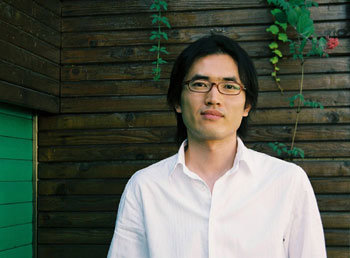Weltevree, Korea Is Your Home

J.J.Weltevree (1595~?), a Dutchman, set foot on the Korean soil 26 years earlier than Hendrik Hamel did. Though the book An Account of the SHIPWRECK of a Dutch Vessel on the Coast of the Isle of Quelpaert, together with the Description of the Kingdom of COREA and some historical materials mentioned him, historians do not have enough information to know who he really was.
That vacuum was filled by the imagination of Kim Kyeong-uk, the author of the new novel, The Millennium Kingdom. His book is a story about a blue-eyed stranger who happened to reach Korea. He was given a Korean name, Park Yeon, built a cannon together with Koreans, and fought against the Qing Dynasty, which invaded Korea in 1636.
Kim is known to the public as a writer who employed cinematic imagination in his two previous novels Did Leslie Cheung really die? and Who murdered Kurt Donald Cobain? So, readers might be caught off guard by his unexpected foray into the historical novel genre. But it reads well. His simple, classical writing style is reminiscent of that of Kim Hun, one of Koreas distinguished writers. Kim didnt deny this and said, I dont think it is bad to be influenced by my favorite writer. As the speaker of the novel is Weltevree himself, Koreas landscape and its people are illustrated from his point of view, which makes the novel a fast read.
In 1627, when the sea trade was brisk, Ouwerkerek, a merchant ship registered with the Netherlands, departed India and was headed for Nagasaki, Japan. But the vessel shipwrecked near Korea, then ruled by the Joseon Dynasty. There were only three survivors: J.J.Weltevree, the cook Evoken, and Denison the cabin boy. Following the orders of King Injo, they were assigned to the army in charge of protecting the capital city. While optimistic, brazen-faced Eboken adjusted well to his new life in Korea, but young Denison failed to adapt and was killed while attempting a breakout.
One feels for Weltevree, who was driven into a dire situation that he had never imagined. He probably blamed God for placing him in this fate, but he finally faced up to his mysterious fate, the author explained. In fact, from his perspective, Joseon was as inexplicable a country as his life was. Weltevree said, The infidel in this kingdom holds the hot of the sun and the cold of the moon at the same time. I was afraid of their energy which is so strong that it verges on illness. However, he helped a gun master build cannons and got accustomed to local customs, ethics, and religion, and ended up being a Korean. The author illustrates how his mind was changed.
According to Seo Young-jae, a critic, new-age historical novels that take issue with present problems are in vogue. Prime examples are Namhansansung by Kim Hun, and Lee Jin by Sin Kyeong-suk. How can one relate Kims novel to 21st Century Korea? Kim said, The life of Park Yeon is meaningful in this borderless world. Weltevree, who assimilated himself while in a strange land, shows us what living as a cosmopolitan man of the world really means.
kimjy@donga.com







